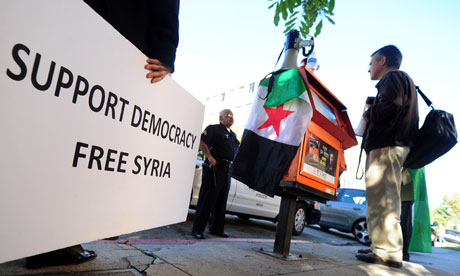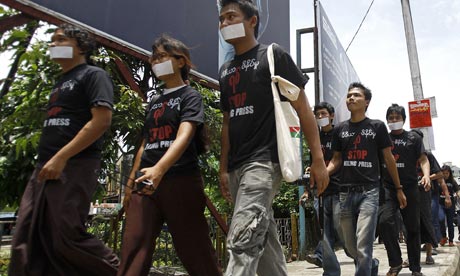Media freedom differs from one country to another. People in some countries do not have the same level of access to independent information and methods that their leaders use to suppress news reports as much as people from other countries do. The most censored countries in the world exhibit patterns that are reflective of media censorship and those patterns include one-man shows, use of orchestrated lies, zero tolerance for negative coverage, and cynical disregard for the welfare of their people. The level of censorship of a country depends on the control of its state over all media, the existence of formal censorship regulations, the imprisonment or harassment that happen among journalists, the extent to which foreign news broadcasts are jammed, restrictions on private internet access and even the use of state violence. Here is a list of the ten countries with strictest media censorship:
10. Belarus

Photo Source: http://www.cpj.org/
Almost all of the broadcast and print outlets in Belarus are government owned. As a result, these media outlets are very effusive in their praises of the Belarus President, Aleksandr Lukashenko. Most independent radio and television stations in this country get rid of politically sensitive subjects to avoid possible clashes with the president. The government of Belarus is also in the practice of shuttering independent newspapers that go against Lukashenko. The allies of the president pressure state printing houses not to print newspapers that are critical of the government. Owners of publishing companies that openly criticize the president are imprisoned for up to five years. The censorship of media is highly implemented in all areas in this country.
9. Syria

Photo Source: http://www.aljazeera.com/
The Media censorship in Syria are under the control and influence of the state. Most newspaper and broadcast outlets in this country are under the hands of regime loyalists and are thus prohibited from disseminating any report with political content. Private and party owners that circulate mild criticisms against the government or any of its policies are powerless because they are whitewashed by government-owned media outlets. Critics of the government are harassed through arrests or warnings, so majority of broadcasters tend to be unwaveringly and vocally supportive of the government regime.
8. Uzbekistan
Photo Source: http://www.hindustantimes.com/
When Uzbekistan President Islam Karimov was elected in 1991, he re-established the Sovite-style dictatorship in Uzbekistan. This type of dictatorship is characterized by brutal intimidation to suppress human rights activists, journalists, or anyone who opposes the government. The president of this country implements an informal system of state censorship in his aim to stop the domestic media from disseminating any information that goes against him or his governance, such as police torture and poverty. He is also widely recognized as the number one jailer of journalists because of the great number of media men that he put behind bars that makes it as one of the most censored countries in the world today.
7. Cuba

Photo Source: http://www.bbc.co.uk/news/
Led by President Fidel Castro, Cuba is a one-party state that owns and controls all media outlets and prohibits its people from gaining access to the Internet. The constitution of this government allows the Communist Party to control the press, believing that freedom of speech and the press should always be in accordance with the goals of the socialist society where censorship and media are inseparable. News in this country is only circulated in four government-owned television channels, two news agencies and several radio stations. The three major newspapers of Cuba are also wholly owned by the government, so they only reflect and represent the views of the Communist Party. This country is also known as one of the major jailers of journalists. Through the years, it has detained, harassed and threatened several journalists with prosecution and barred them from talking of anything that criticizes the Cuban government in any way.
6. Eritrea

Photo Source: http://www.globalpost.com/
Led by Isais Afewerki, this country is the only African country that has not even a single private media outlet. All of the media outlets in this country are owned by the government and are severely monitored by authorities. The repressive policies of the Eritrean government have left Eritrea largely hidden from the international press since Afewerki had covered up the independent press, barring locals from gaining access to independent information where they are also implementing the internet censorship. In this nation, only the privileged ones have access to the Internet. Also, local journalists who release information that hurt the government are held incommunicado while they are locked in detention centers.
5. Libya

Photo Source: http://magharebia.com/
Throughout the Arab world, Libya is the country that has the most tightly controlled media. This country has been led by Colonel Muammar Qaddafi since 1969 and retains a government that upholds anachronism. The Libyan government controls both the print and broadcast media so they do not release news reports that are critical of Qaddafi and his governance. Though internet access is not prohibited in this country, the government has control over sites that promote politics to ensure that none of them releases undesirable facts and opinions about the government especially speech on the internet. People who post anything that is critical of the government are either imprisoned or killed.
4. Equatorial Guinea

Photo Source: http://pulitzercenter.org/
Equatorial Guinea is a country that does not tolerate criticism of the brutal regime of President Teodoro Obiang Nguema Mbasogo, the leader of the country who has been in office since a coup in 1979. Like in other censored countries, all broadcast media in Equatorial Guinea are also owned by the state. The only private radio and television in the country, RTV-Asonga, is owned by the presidential son. There are several private newspapers circulating in Guinea but these newspapers rarely publish factual information because journalists are being pressured by the government not to publish anything that may hurt the government as part of the implementation of media censorship.
3. Turkmenistan

Photo Source: http://www.rferl.org/
The government of Turkmenistan led by Saparmurat Atayevich Niyazov owns all domestic media in the country. Before releasing news reports, the administration of Niyazov filters out their content to make sure that they are pro-government. It is also the president of the state that appoints the editors in every media outlet and approves the content of the front page of every major dailies, ensuring that each of them has a prominent picture of him. He also ordered the closing down of all libraries in the country except for the one that keeps his books as the rigid implementation of censorship of media in all areas. The state television also displays a golden profile of the president at the bottom of the screen, highlighting his strengths more than necessary.
2. Burma

Photo Source: http://www.telegraph.co.uk/
Burma is led by a military junta known as the State Peace and Development Council. This group owns all the daily newspapers, radio and television channels in the country. Media in Burma are not allowed to report any antigovernment sentiments. Even citizens who listen to the BBC or Radio Free Asia in public are arrested for outward display of government opposition. Bagan Cybertech, the major Internet service and satellite-feed provider of Burma, is also controlled by the junta.
1. North Korea

Photo Source: http://www.adnkronos.com/IGN/News/
North Korea is the only country known to create the deepest information void in the world because of its strictness in media censorship. In this country, all domestic radio, television, and newspapers are controlled by the government so no anti-government sentiment is allowed to circulate. Even radio and television receivers are restricted to frequencies that are allowed by the government. These stations disseminate information that is wholly supplied by the official Korean Central News Agency (KCNA), which is also controlled by the North Korean Government. Economic problems such as poverty and famines are also never mentioned in news reports since they are believed to reflect the weakness of the government.

